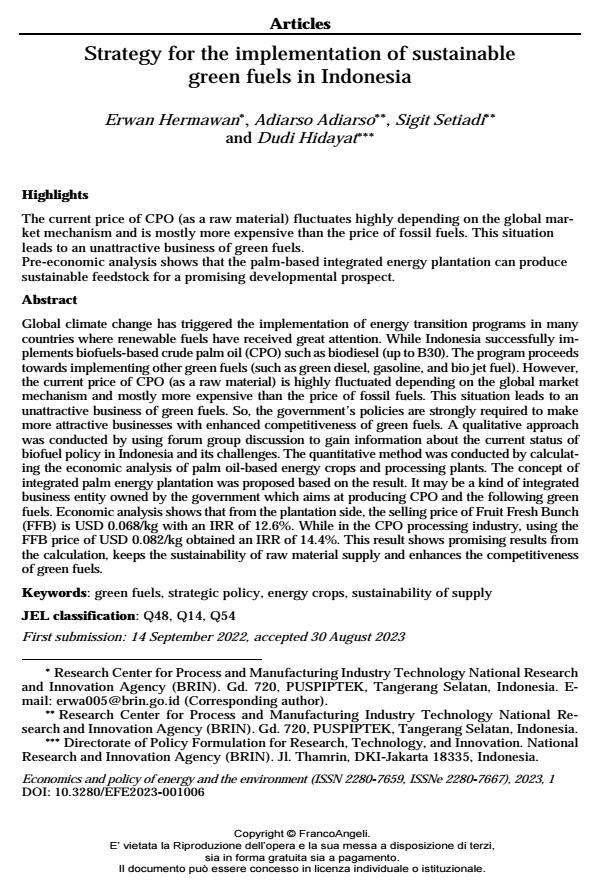Strategy for the implementation of sustainable green fuels in Indonesia
Titolo Rivista ECONOMICS AND POLICY OF ENERGY AND THE ENVIRONMENT
Autori/Curatori Erwan Hermawan, Adiarso Adiarso, Sigit Setiadi, Dudi Hidayat
Anno di pubblicazione 2023 Fascicolo 2023/1
Lingua Inglese Numero pagine 37 P. 103-139 Dimensione file 355 KB
DOI 10.3280/EFE2023-001006
Il DOI è il codice a barre della proprietà intellettuale: per saperne di più
clicca qui
Qui sotto puoi vedere in anteprima la prima pagina di questo articolo.
Se questo articolo ti interessa, lo puoi acquistare (e scaricare in formato pdf) seguendo le facili indicazioni per acquistare il download credit. Acquista Download Credits per scaricare questo Articolo in formato PDF

FrancoAngeli è membro della Publishers International Linking Association, Inc (PILA)associazione indipendente e non profit per facilitare (attraverso i servizi tecnologici implementati da CrossRef.org) l’accesso degli studiosi ai contenuti digitali nelle pubblicazioni professionali e scientifiche
Global climate change has triggered the implementation of energy transition programs in many countries where renewable fuels have received great attention. While Indonesia successfully im- plements biofuels-based crude palm oil (CPO) such as biodiesel (up to B30). The program proceeds towards implementing other green fuels (such as green diesel, gasoline, and bio jet fuel). However, the current price of CPO (as a raw material) is highly fluctuated depending on the global market mechanism and mostly more expensive than the price of fossil fuels. This situation leads to an unattractive business of green fuels. So, the government’s policies are strongly required to make more attractive businesses with enhanced competitiveness of green fuels. A qualitative approach was conducted by using forum group discussion to gain information about the current status of biofuel policy in Indonesia and its challenges. The quantitative method was conducted by calculat- ing the economic analysis of palm oil-based energy crops and processing plants. The concept of integrated palm energy plantation was proposed based on the result. It may be a kind of integrated business entity owned by the government which aims at producing CPO and the following green fuels. Economic analysis shows that from the plantation side, the selling price of Fruit Fresh Bunch (FFB) is USD 0.068/kg with an IRR of 12.6%. While in the CPO processing industry, using the FFB price of USD 0.082/kg obtained an IRR of 14.4%. This result shows promising results from the calculation, keeps the sustainability of raw material supply and enhances the competitiveness of green fuels.
Parole chiave:green fuels, strategic policy, energy crops, sustainability of supply
Jel codes:Q48, Q14, Q54
- Effect of energy consumption on economic growth and sustainability: Panel evidence from PCSE and FGLS Titiksha Das, Debasis Chakraborty, in ECONOMICS AND POLICY OF ENERGY AND THE ENVIRONMENT 2/2024 pp.37
DOI: 10.3280/EFE2024-002002 - Optimized utilization of spent bleaching earth to enhance economic performance of integrated biodiesel-cooking oil plants Adiarso Adiarso, Erwan Hermawan, Ai Nelly, Danis E.P. Wicaksana, R. Agung Wijono, Ayu Lydi Ferabianie, Hari Setiawan, Sigit Setiadi, Ermawan D. Setiyadi, Lenggogeni, Sunartono, Ari Marsudi, Yanti R. Dewi, Saparudin, Isyalia D. Handayani, Kaseno Kaseno, in Case Studies in Chemical and Environmental Engineering 100784/2024 pp.100784
DOI: 10.1016/j.cscee.2024.100784
Erwan Hermawan, Adiarso Adiarso, Sigit Setiadi, Dudi Hidayat, Strategy for the implementation of sustainable green fuels in Indonesia in "ECONOMICS AND POLICY OF ENERGY AND THE ENVIRONMENT" 1/2023, pp 103-139, DOI: 10.3280/EFE2023-001006